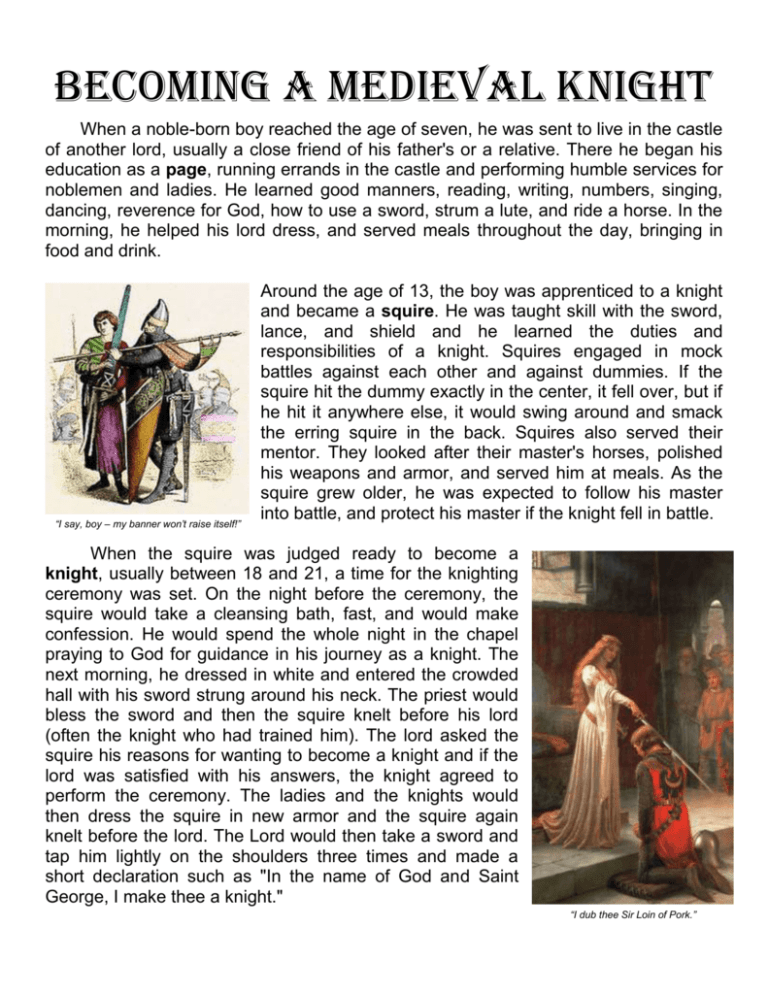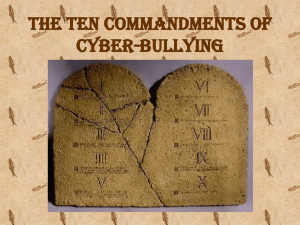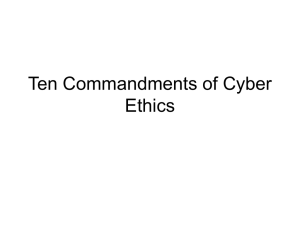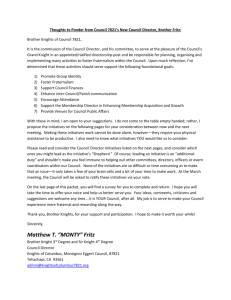knight - Baltimore City Public School System
advertisement

Becoming a Medieval Knight When a noble-born boy reached the age of seven, he was sent to live in the castle of another lord, usually a close friend of his father's or a relative. There he began his education as a page, running errands in the castle and performing humble services for noblemen and ladies. He learned good manners, reading, writing, numbers, singing, dancing, reverence for God, how to use a sword, strum a lute, and ride a horse. In the morning, he helped his lord dress, and served meals throughout the day, bringing in food and drink. “I say, boy – my banner won’t raise itself!” Around the age of 13, the boy was apprenticed to a knight and became a squire. He was taught skill with the sword, lance, and shield and he learned the duties and responsibilities of a knight. Squires engaged in mock battles against each other and against dummies. If the squire hit the dummy exactly in the center, it fell over, but if he hit it anywhere else, it would swing around and smack the erring squire in the back. Squires also served their mentor. They looked after their master's horses, polished his weapons and armor, and served him at meals. As the squire grew older, he was expected to follow his master into battle, and protect his master if the knight fell in battle. When the squire was judged ready to become a knight, usually between 18 and 21, a time for the knighting ceremony was set. On the night before the ceremony, the squire would take a cleansing bath, fast, and would make confession. He would spend the whole night in the chapel praying to God for guidance in his journey as a knight. The next morning, he dressed in white and entered the crowded hall with his sword strung around his neck. The priest would bless the sword and then the squire knelt before his lord (often the knight who had trained him). The lord asked the squire his reasons for wanting to become a knight and if the lord was satisfied with his answers, the knight agreed to perform the ceremony. The ladies and the knights would then dress the squire in new armor and the squire again knelt before the lord. The Lord would then take a sword and tap him lightly on the shoulders three times and made a short declaration such as "In the name of God and Saint George, I make thee a knight." “I dub thee Sir Loin of Pork.” The Code of Chivalry PRIMARY SOURCE DOCUMENTS: Source 1: The Ten Commandments of the Code of Chivalry: from Chivalry by Leon Gautier I. II. III. Thou shalt believe all that the Church teaches, and shalt observe all its directions. Thou shalt defend the Church. Thou shalt repect all weaknesses, and shalt constitute thyself the defender of them. IV. Thou shalt love the country in the which thou wast born. V. Thou shalt not recoil before thine enemy. VI. Thou shalt make war against the Infidel without cessation, and without mercy. VII. Thou shalt perform scrupulously thy feudal duties, if they be not contrary to the laws of God. VIII. Thou shalt never lie, and shall remain faithful to thy pledged word. IX. Thou shalt be generous, and give largess to everyone. X. Thou shalt be everywhere and always the champion of the Right and the Good against Injustice and Evil. Source 2: The Code of Chivalry - England Supplement - Uhhh, this seems like kind of a lot to remember… Live to serve King and Country. Live one's life so that it is worthy of respect and honor. Live for freedom, justice and all that is good. Never attack an unarmed foe. Never use a weapon on an opponent not equal to the attack. Never attack from behind. Avoid lying to your fellow man. Avoid cheating. Obey the law of king, country, and chivalry. Protect the innocent. Exhibit self control. Show respect to authority. Respect women. Source 3: The Twelve Chief Rules in Love: from The Art of Courtly Love by Andreas Capellanus Thou shalt keep thyself chaste for the sake of her whom thou lovest. Thou shalt not knowingly strive to break up a correct love affair that someone else is engaged in. Thou shalt not choose for thy love anyone whom a natural sense of shame forbids thee to marry. Thou shalt be in all things polite and courteous.







